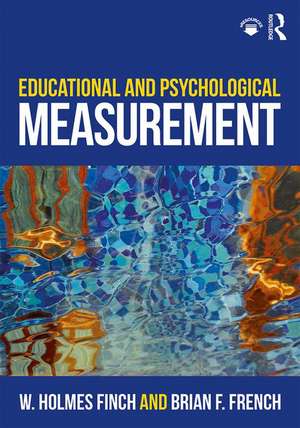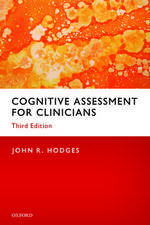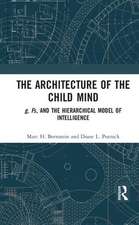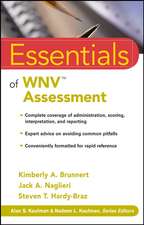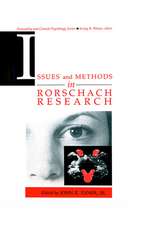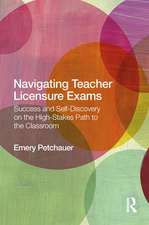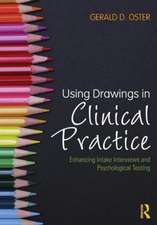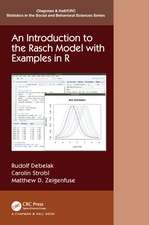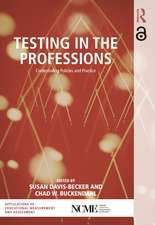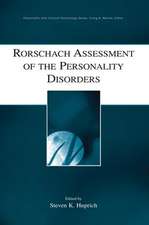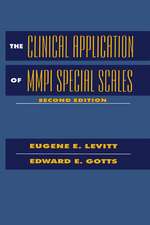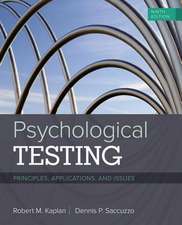Educational and Psychological Measurement
Autor W. Holmes Finch, Brian F. Frenchen Limba Engleză Paperback – 22 oct 2018
Features:
- "How it Works" and "Psychometrics in the Real World" boxes break down important concepts through worked examples, and show how theory can be applied to practice.
- End-of-chapter exercises allow students to test their comprehension of the material, while suggested readings and website links provide resources for further investigation.
- A collection of free online resources include the full output from R, SPSS, and Excel for each of the analyses conducted in the book, as well as additional exercises, sample homework assignments, answer keys, and PowerPoint lecture slides.
| Toate formatele și edițiile | Preț | Express |
|---|---|---|
| Paperback (1) | 683.04 lei 6-8 săpt. | |
| Taylor & Francis – 22 oct 2018 | 683.04 lei 6-8 săpt. | |
| Hardback (1) | 1128.11 lei 6-8 săpt. | |
| Taylor & Francis – 22 oct 2018 | 1128.11 lei 6-8 săpt. |
Preț: 683.04 lei
Preț vechi: 803.57 lei
-15% Nou
Puncte Express: 1025
Preț estimativ în valută:
130.70€ • 136.74$ • 108.57£
130.70€ • 136.74$ • 108.57£
Carte tipărită la comandă
Livrare economică 03-17 aprilie
Preluare comenzi: 021 569.72.76
Specificații
ISBN-13: 9781138963443
ISBN-10: 1138963445
Pagini: 468
Ilustrații: 102 Tables, black and white
Dimensiuni: 178 x 254 x 40 mm
Greutate: 0.82 kg
Ediția:1
Editura: Taylor & Francis
Colecția Routledge
Locul publicării:Oxford, United Kingdom
ISBN-10: 1138963445
Pagini: 468
Ilustrații: 102 Tables, black and white
Dimensiuni: 178 x 254 x 40 mm
Greutate: 0.82 kg
Ediția:1
Editura: Taylor & Francis
Colecția Routledge
Locul publicării:Oxford, United Kingdom
Cuprins
1. Introduction to Educational and Psychological Measurement 2. Basic Statistical Concepts for Measurement 3. Classical Test Theory 4. Reliability 5. Generalizability Theory 6. Estimating Interrater Agreement 7. Exploratory and Confirmatory Factor Analysis 8. Validity 9. Developing Validity Evidence 10. Item Analysis 11. Item Response Theory (IRT) 12. Differential Item Functioning (DIF) 13. Cognitive Diagnostic Models (CDM) 14. Equating and Scaling 15. Standard Setting 16. Computer Adaptive Testing (CAT) 17. Recent and Future Directions in Measurement
Notă biografică
W. Holmes Finch is the George and Frances Ball Distinguished Professor of Educational Psychology at Ball State University, USA.
Brian F. French is a Professor of Educational Psychology at Washington State University, USA.
Brian F. French is a Professor of Educational Psychology at Washington State University, USA.
Recenzii
‘I encourage all researchers and students in the social and behavioral sciences to read this excellent book. Writing in an engaging style, the authors provide important connections between established foundations of educational and psychological measurement and recent innovations critical to advancing rigorous applied and theoretical research. The authors provide clear examples of how equations work supported by concise written explanations, which readers will find highly useful in their research.’ Larry R. Price, Professor and Director of Methodology, Measurement, and Statistical Analysis, Texas State University, USA
‘Finch and French have considerable experience teaching and researching in the area of measurement and psychometrics, and it shines throughout the pages of this volume. This very readable text is absolutely suitable for graduate students and applied researchers seeking a one-stop reference on foundational measurement-related issues arising in educational and psychological assessments. Readers’ understanding of basic and advanced concepts is enhanced through the numerous How it Works sections found throughout the book, engaging with the end-of-chapter exercises, and exploring the myriad of supplementary materials made available online.’Jeffrey R. Harring, Department of Human Development and Quantitative Methodology, University of Maryland, College Park, USA
‘Educational and Psychological Measurement provides a comprehensive and accessible presentation of the foundations of and latest developments in test theory. The presentation of information is succinct with detailed examples to enhance learning, and the current references will encourage readers to further explore topics of interest in more detail. The book will serve as an essential reference for graduate students, as well as applied and methodological researchers alike. This is a welcomed and refreshing addition to the literature on educational and psychological measurement.’ Jason C. Immekus, Associate Professor, University of Louisville, USA
‘Finch and French have considerable experience teaching and researching in the area of measurement and psychometrics, and it shines throughout the pages of this volume. This very readable text is absolutely suitable for graduate students and applied researchers seeking a one-stop reference on foundational measurement-related issues arising in educational and psychological assessments. Readers’ understanding of basic and advanced concepts is enhanced through the numerous How it Works sections found throughout the book, engaging with the end-of-chapter exercises, and exploring the myriad of supplementary materials made available online.’Jeffrey R. Harring, Department of Human Development and Quantitative Methodology, University of Maryland, College Park, USA
‘Educational and Psychological Measurement provides a comprehensive and accessible presentation of the foundations of and latest developments in test theory. The presentation of information is succinct with detailed examples to enhance learning, and the current references will encourage readers to further explore topics of interest in more detail. The book will serve as an essential reference for graduate students, as well as applied and methodological researchers alike. This is a welcomed and refreshing addition to the literature on educational and psychological measurement.’ Jason C. Immekus, Associate Professor, University of Louisville, USA
Descriere
Provides the most current coverage of measurement and psychometrics in a single volume, covering equating and scaling, item response theory, standard setting, and computer adaptive testing.
